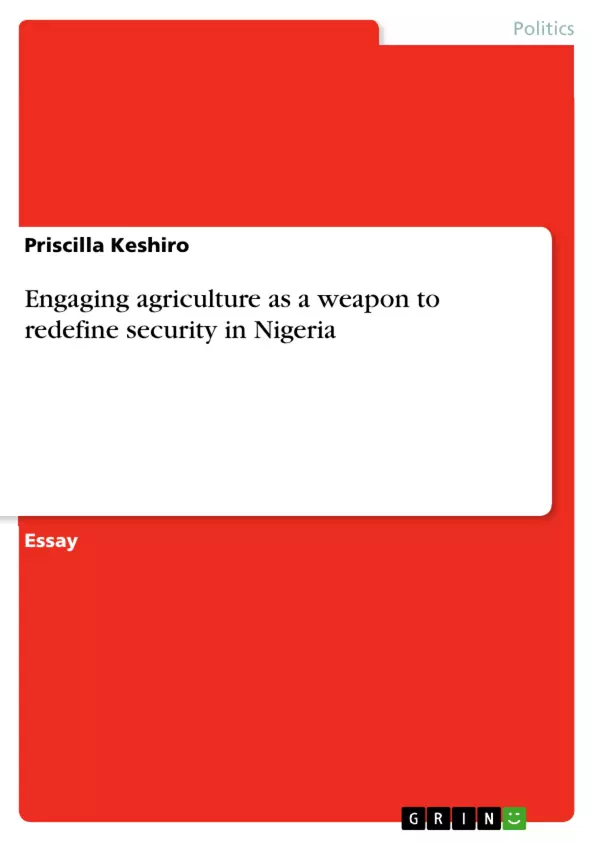This paper discusses the metamorphosis that made security be viewed in relations to the needs of man such as food. The traditional concept of security involved the activities of the armed forces just like in several wars man has witnessed. Nigeria as do the rest of the world are in need of this security; food security which a well engaged “agro-potentials” can bring.
Several causes of violence, conflicts and so on can now be traced to deprivation of food, means to get food or adequate access to it. Stability in Nigeria as well as in other countries is for the most part a function of food security in the country in terms of price, access, nutrition and sometimes stability in prices of the food. Hunger and malnutrition is as dangerous as or even more so than other causes of breaches in security because the effects are not restricted to the poor or less privileged, even the armed forces would be affected adversely.
In essence, the paper puts forward that as a developing country with aspirations of being developed, agriculture should be engaged vigorously to create a situation of food security in all parts of the country in order to avoid the consequences that follow lack of action.
Inhaltsverzeichnis (Table of Contents)
- Evolution and Change in the Concept of Security
- Human Security and Food Security
- Agriculture as Weapon to Redefine Security in Nigeria
Zielsetzung und Themenschwerpunkte (Objectives and Key Themes)
This paper aims to demonstrate the critical role of agriculture in redefining security in Nigeria, emphasizing food security as a fundamental aspect of human security. The paper argues that traditional security focused solely on military preparedness and national defense, while the evolving concept of security prioritizes the well-being and safety of individuals, particularly in relation to food access and availability.
- Evolution of the Security Concept
- Human Security and Food Insecurity
- Agriculture's Importance in Food Security
- Redefining Security in Nigeria
- Policy Recommendations for Agriculture Development
Zusammenfassung der Kapitel (Chapter Summaries)
- The paper begins by tracing the historical evolution of the security concept, highlighting the shift from a state-centric focus on military power to a human-centric approach that emphasizes the importance of food security. It explores the relationship between food insecurity and human security, arguing that food shortages and price increases can lead to social unrest and instability.
- The paper further emphasizes the critical role of agriculture in achieving food security and promoting national stability. It argues that engaging agriculture vigorously is essential for ensuring adequate food production and preventing food shortages, thereby contributing to a more secure environment for the nation.
- The paper analyzes the impact of food insecurity on Nigeria's security, drawing attention to the country's reliance on food imports and the potential consequences of food shortages and price increases. It advocates for policy interventions aimed at promoting domestic food production and reducing reliance on imports.
Schlüsselwörter (Keywords)
Key terms and concepts explored in the paper include security, human security, food security, agriculture, national security, food insecurity, conflict, poverty, rural development, and policy recommendations.
Frequently Asked Questions
How is the concept of security changing in Nigeria?
Security is shifting from a traditional military focus to a human-centric approach that includes food security and access to basic needs.
Why is food security considered a national security issue?
Deprivation of food often leads to violence and conflict. Hunger can destabilize a country and even adversely affect the armed forces.
What role should agriculture play in Nigeria's development?
Agriculture should be engaged vigorously as a "weapon" to ensure food security, reduce reliance on imports, and prevent social unrest.
What are the consequences of food insecurity?
Consequences include malnutrition, social instability, and breaches in national security that affect all levels of society.
What policy recommendations does the paper suggest?
It advocates for policy interventions that promote domestic food production and create a stable environment for agricultural development.
- Citar trabajo
- Priscilla Keshiro (Autor), 2014, Engaging agriculture as a weapon to redefine security in Nigeria, Múnich, GRIN Verlag, https://www.grin.com/document/337188



